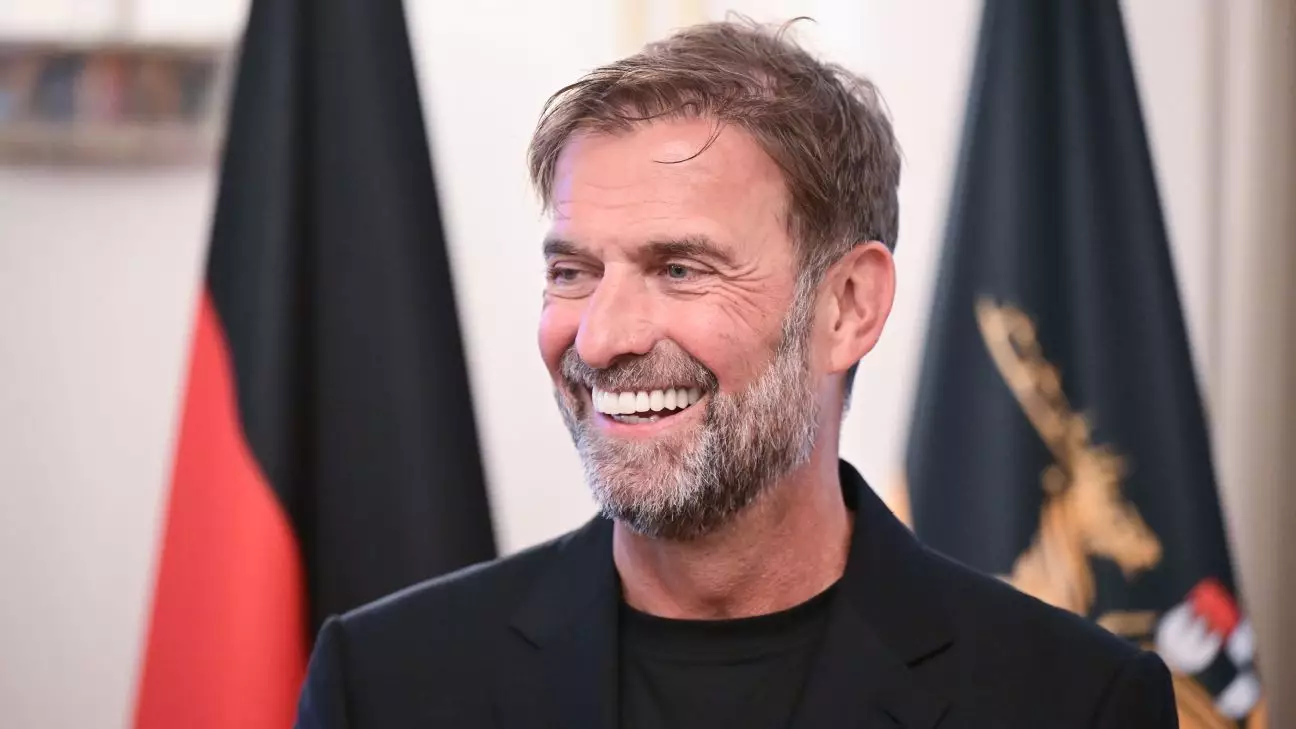Jürgen Klopp’s recent transition to the role of “global head of soccer” for the Red Bull football family not only marks a career shift but also sheds light on the contrasting perspectives of football culture in Germany versus England. Though nearly ten years have elapsed since Klopp last worked full-time in Germany, his omnipresence remains evident, particularly in the media, with his jovial personality and endorsements that resonate with audiences across the nation. As a beloved public figure in German football, Klopp’s decision to join Red Bull—an organization notorious for its controversial entry into the football landscape—stirs mixed emotions among fans and commentators alike.
Klopp has established himself as more than just a coach; he embodies a brand that many associate with passion, joy, and success. His jovial personality extends beyond the pitch and into commercials for various products, showcasing an adaptability that can both elevate commercial brands and endorse a philosophy of football that appeals to the masses. However, his decision to align himself with a brand that many German football aficionados view as a corporate intruder raises essential questions about loyalty, tradition, and the evolving nature of sports.
To understand Klopp’s controversial choice, one must grasp the intricacies of Red Bull’s entry into the football realm. Established in 2009, RB Leipzig has faced considerable backlash due to its unconventional operating model that sidesteps the traditional structures governing German football clubs. Their formation circumvented the heavily regulated “50+1” ownership structure that mandates fan ownership, leading to their characterization as corporate puppets. Consequently, the German football community holds a deeply rooted skepticism towards Red Bull, perceiving it as emblematic of commercialization at the expense of footballing heritage.
As Klopp integrates into this framework, his identity as “the people’s man” is inevitably challenged. The excitement that initially greeted his appointment is clouded by concerns regarding his endorsement of a brand that operates outside the traditional guidelines respected by Bundesliga clubs. A recent poll featured in Kicker revealed that a staggering 72% of respondents disapproved of Klopp’s decision, encapsulating the disappointment held by many fans who believed he represented a commitment to the more idyllic aspects of football.
Interestingly, responses to Klopp’s career move seem to diverge sharply between England and Germany. In England, many perceive his decision as simply the next logical step in a successful career that entitled him to pursue personal interests. However, the German public’s reaction has been steeped in nostalgia for authenticity and a resistance to commercialization—a landscape Klopp is now navigating. The coverage of his move reflects a cultural shock that extends beyond mere opinions and influences the evolving narrative surrounding football.
German experts like former Eintracht Frankfurt director Fredi Bobic have voiced a more progressive outlook, suggesting that traditionalists are out of touch, while recognizing Red Bull’s established infrastructure within the sport. His stance highlights the tensions that exist between innovation and nostalgia in football, emphasizing the need for adaptations to remain relevant in a rapidly changing sporting landscape.
Klopp’s decision mirrors broader trends within the football landscape where collaboration and evolution are becoming crucial. Notably, clubs are being advised by seasoned professionals with specific expertise, as reflected in the managerial choices across the Red Bull affiliates. This structure shapes not only the organizational landscape but also enhances opportunities for growth, underscoring that alliances can lead to improvements on and off the field.
This evolution begs a fundamental re-evaluation of what it means to be involved in football in the modern era. While traditional values remain cherished, the fullness of this sport’s intricate tapestry demands a balance between the community’s historical roots and the necessity for progress and adaptation. The upcoming tenure of Klopp at Red Bull is a test case, not just for him but for the ideals of football culture in general.
As Klopp embarks on this new chapter, the ripple effects of his decision will extend beyond the confines of his role at Red Bull. It will illuminate the dialogues around football’s cultural identity, inviting fans to confront uncomfortable truths about the evolving nature of sports in a corporate world. While some may view this as a betrayal of tradition, others may see an opportunity for growth and modernization.
Klopp’s journey at Red Bull may challenge established paradigms, inviting a reconsideration of what the future of football can look like—a blend of commercial viability and authentic cultural engagement. As the boundaries of tradition and modernity blur, fans, both faithful and skeptical, may find themselves part of an ongoing dialogue that defines the sport in the years to come. Ultimately, Klopp’s gamble could pave new paths, reshaping the narratives surrounding football not just in Germany but worldwide.


Leave a Reply